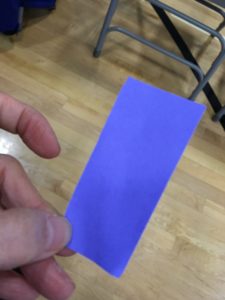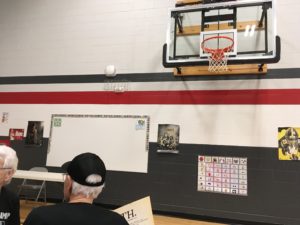A Magical Night in Iowa

This week, I participated in my first Iowa caucus. I was both curious and excited to be part of a process that felt uniquely Iowan—down to earth, respectful, and straightforward. I would be sitting with my neighbors and hearing about the candidates. I have been an independent all of my life, but decided to register with a party to experience a more intimate look at politics. I was not disappointed.
I barely made it to our caucus meeting place. Bad weather delayed my return to Iowa from vacation. I flew back two days later than planned, on Caucus Day. Technical issues with a plane door created another delay in arriving at the Eastern Iowa Airport. (Yes, the Alaska Airlines incident was on my mind.) There was one last delay at the baggage claim, with my husband texting me from the car, “Still waiting for bags? I’m going to pull up now. Maybe your phone is dead.”
By the time we arrived home, it was 6:20pm. I was advised to arrive at my neighborhood caucus site by 6:30pm, in order to check in for a 7pm start.
After a quick dinner of homemade soup (thanks to my dear hubby), we hopped back in the car. There are over 1600 precincts in Iowa, with assigned places to caucus. Our precinct meeting place was an elementary school gym, about a mile away from home. It crossed our minds that with below zero temperatures, our car might not start after the voting was done. We trusted that someone would give us a ride, if necessary.
The caucuses are billed as a discussion with your neighbors, before writing a name on a ballot. Waiting in line, a man a few feet in front of me turned around and waved to a friend right behind me. The two men bantered about mistakenly going to “St. Pat’s” where the prior caucus was held, the last time they attended a caucus, and what precinct we were part of. One joked about how each time they feel as if “this is the most important election to be a part of.” I imagine that every four years, the same conversation happens.
Being a newbie has its advantages. My husband had thoroughly researched where and when to meet and what to bring in terms of ID.
When we got to the front of the line to check in, there were confused and frustrated faces and fingers scrolling on phones. The two volunteers, a man and a woman, were directing others to a website for the Johnson County auditor, as a way to verify their party affiliation. Someone mentioned that it would be nice to let those in the back of the line know about this process. The woman volunteer responded with an edge in her voice, “Maybe you could be that person.” The man volunteer muttered, “I didn’t think we would run out of forms.” Democracy is messy.
After getting checked in, the man volunteer pulled out a ballot from a clear plastic sandwich bag and handed it to me. It reminded me of doling out a kid’s snack after soccer practice, only this wasn’t edible and it was infinitely more valuable. My ballot was a simple piece of purple paper that looked to be cut with scissors and which fit in the palm of my hand. I thought, “This is it?”

The all important ballot upon which a name would be written
Democracy is humble.
I surveyed the gymnasium. The grey metal fold up chairs were set up in rows on the wooden floor, facing a basketball hoop. I estimated there were less than 100 caucusgoers. Underneath and to the left of hoop was a table with two chairs, where the votes would be counted.

The elementary school gym, where my precinct’s caucus was held
In the opposite corner of the gym, a media company had set up a group of talking heads, broadcasting under bright lights. No one in our corner of the room paid them any attention. These were two worlds that were light years apart, under one big roof. Outsiders pontificated about a projected outcome that insiders would decide in less than an hour. Instead of feeling like a goldfish in a fish bowl, I felt what every voter should feel—that my vote mattered.

Media pundits, relegated to a corner of the gym
My husband and I took seats in the second row and waited for the show to begin, which started 25 minutes late. No one seemed to be bothered by the late start. Iowans are a patient lot. In the meantime, my husband chatted up the woman next to him, an accountant for a local company. She was not a regular caucus goer, even though there had been opportunities to attend in the past. When asked why she attended that night, she responded simply, “I want my voice to be heard.”
After introductory remarks and motions on electing a chairperson (aka woman volunteer) and a secretary (aka man volunteer) of the party precinct, Madam Chair passed around an envelope for donations to the party. I thought this was a rude way to start the proceedings, but others seemed to expect it. I gave a fiver to the organization, for the effort.
Our moderator for the evening explained that we would hear from supporters of the candidates and that we would go alphabetically. Only we didn’t. After the first supporter spoke, Madam Chair realized that she had skipped over a candidate. No one stood up to speak on behalf of the skipped candidate. I guess it’s the thought that counts. Or more accurately, it’s the process that counts. Later after several people had spoken, our moderator suggested we start voting. Someone in the audience pointed out that one candidate had not yet been spoken for. A man speaking on behalf of this candidate emerged quickly from the back of the room. Democracy is imperfect and recoverable.
The speeches were unremarkable in their content, yet the speakers were memorable. It’s not what they said, but how they said it that sticks with me.
There was the career military man who appeared to be his late 70’s, maybe early 80’s. He and his wife wore matching t-shirts and their vibe was a mix of eagerness in wanting to do right by someone and anxiety in the possibility of screwing something up. These are the kind of people who arrive hours before the start of an event, waiting for the doors to open. As the man got up from his seat to speak on behalf of his preferred candidate, he carried a placard from the campaign. He had written down on the back of the placard his entire speech, words that he held deep within, maybe mulled over for days or weeks, now spoken aloud for all to hear. I don’t remember what he said. What I do remember is that his voice was resolute and measured, as his wife looked on. I sensed that this man’s heart had been broken, by what he had seen in a country he dearly loved. He was putting his faith in someone who he thought could heal his heart.
Another speaker talked about knowing the candidate as a friend in school, outworking everyone else. His admiration was palpable, his trust complete in witnessing a leader who rose up the ranks. He spoke with confidence, the kind of confidence that a big brother might have for a little sister who had done him proud. This was not the first speaker’s rodeo on behalf of his friend, and yet he came across as authentic, as if to say, “Let me tell you who my friend really is, beyond the broad brushstrokes of media coverage.”
One speaker was mad as hell. He saw in his candidate someone who could right the wrongs of the world. Finally, the insufferable injustices would stop. He pinned his hopes on action, not words. Like the career military man, he had been wounded metaphorically. Underneath anger, there is often hurt or disappointment. At some point, this speaker decided to turn disillusionment into hope.
Democracy is passionate, sometimes in response to pain.
The speaker that I found most fascinating was one who almost didn’t show up. When a certain candidate’s name was called out, there was silence. It was a pause that I had not expected. Again, the name was called out–going once, going twice—until a man stepped to the front of the room from the back of the room. Whether this delayed reaction was a lapse of attention (You’re on!) or polite shyness (I’ll just wait to see if someone else would like to speak), I couldn’t tell.
Democracy sometimes needs to be coaxed.
The audience was just as remarkable. There was no booing, no heckling, no jeering–just neighbors who showed what it meant to be good listeners. Their genuine clapping after each speaker emerged from kindness and grace. No one got canceled. Every voice mattered. It has been a long time, too long, since I have been in a room where politics is the focus and people were kind to one another. When did we forget civility?
Democracy is respectful.
Once the speeches were over, it was time to vote. It hadn’t occurred to me that I would need a pen to write a name on my ballot, disguised as a lavender slip of paper. I waited until the accountant sitting next to my husband finished writing and offered up her pen. Leave it to a numbers person to come prepared.
Democracy sometimes needs a little help.
It was at this point that Mister Secretary came around to collect our ballots—with a brown paper bag. It was the kind of bag that I would have packed my office lunch in, 20 years ago. Nothing fancy. Perfectly functional. Multiple uses.
Democracy is practical.
After collecting all of the ballots, Mister Secretary returned to his seat at the table, facing the voters. He asked for a volunteer. I immediately shot my hand up and said, “I’ll volunteer!” As I walked to the table, I asked, “What do you want me to do?” There was a chuckle in the crowd, as if to say, “You silly woman. You volunteered for something you have no idea about?” No matter, as I quickly realized that I was being asked to help count the ballots. I felt like I had hit the jackpot. I liken it to being at a Catholic mass and the priest asking for help with giving out Communion wafers. “You trust me to do this important job? I’m in!” Other caucusgoers soon joined me at the table, ready to start counting.
Democracy trusts that the average person is honest.
We sorted the ballots in piles by candidate. Each pile was counted by two different people, with Mister Secretary recording the totals. Seeing the handwritten name on each ballot, I couldn’t help notice misspellings and exclamation marks, cursive and letter block writing, last names and full names. I whispered my totals to the man with the pen. There was something special and sacred about these numbers. I was conveying the voice of the people, through simple numbers. With just 76 votes cast, every vote mattered.
The top vote-getter was the candidate where the speaker almost didn’t come forward to offer support. I find this ironic. Is this a sign of the Silent Majority? Maybe. Iowans aren’t showy people.
Democracy can be quiet and understated.
People say that results matter. They do. Buried within the results is a story. The candidate who came out on top at our precinct was just one vote ahead of the next candidate. The county that I live in has a total of 64 precincts. That night, 64 secretaries in 64 precincts were relaying their tallies to create a county-wide total. The same candidate who won my precinct also won my county—by one vote. It was the only county in Iowa—out of 99 counties–that would go to this candidate.
I like to think that my vote made the difference. It mattered that I rushed home from the airport, had a quick dinner, and ventured out on a bone-chilling night to caucus.
Democracy matters. Your vote matters. You matter.
I’ve told this story to several people and what I have heard repeatedly is “You’ve inspired me.”
The Iowa caucuses inspired me. Being part of the process has given me hope. I wish that every voter across the U.S. could experience a similar process. One where you gather locally, in a humble place, and let the passion, messiness, respect, kindness, imperfection and honesty of fellow human beings wash over you. One where people applaud, not necessarily because they agree with you, but because you made the effort to show up and speak up. One where the crowd is intimate, trying out their best version of democracy, and trusting that their vote matters.
Such a valuable — and precious and profound — experience, Carol. Thank you.
Thanks, Anne, for your feedback. Glad that I could share the experience with you!
thank you for this blog. inspiring to know that one vote matters. I live in one of the “other states” (not iowa, New Hampshire or any of the electoral college biggies. the only election I missed was when my son had the audacity to come early on election day!
I lived in one of the “other” states for a long time (Colorado) and I felt detached from the process. Mail in ballots are convenient but don’t provide the same kind of engagement as showing up in person. Good for you on exercising your vote throughout the years!
I appreciate you and your representation of “my Iowa people” as humble, respectful and imperfectly perfect, dear Carol. I could not be less disappointed, although not surprised, in where and with whom they landed as their primary candidate. Yet you raised my hope and spirits by reminding of their internal goodness and belief that they are doing their right thing and know it matters.
Thanks for your comments, Ginny. I think most people are humble and respectful, given the right environment. We are all imperfectly perfect. This experience showed me that people want to know that someone cares and that their voice matters. They want their leaders to “get” them.
This is beautiful, Carol. Love all the varying references to democracy and the realness, intimacy, respect and humor that you experienced, and we get to experience by reading. Wow at the end – yes, every vote absolutely mattered! Thank you
Thanks, Justine, for your comments. I had become jaded about the political process and I am guessing others had as well. This experience touched me deeply, and gave me a new appreciation for being a US citizen, in an imperfect system, with imperfect people.
I love the idea of showing up and taking part in a messy process where people get to be themselves – and especially the idea of the showing up – without doing amazing, monumental things – being an assertion of hope. It’s the moral support that makes people feel better, isn’t it?
This is a great point, Joanna–moral support. I certainly felt like I was in the same boat with everyone else in the caucus room. We were in the process together. No one was alone.